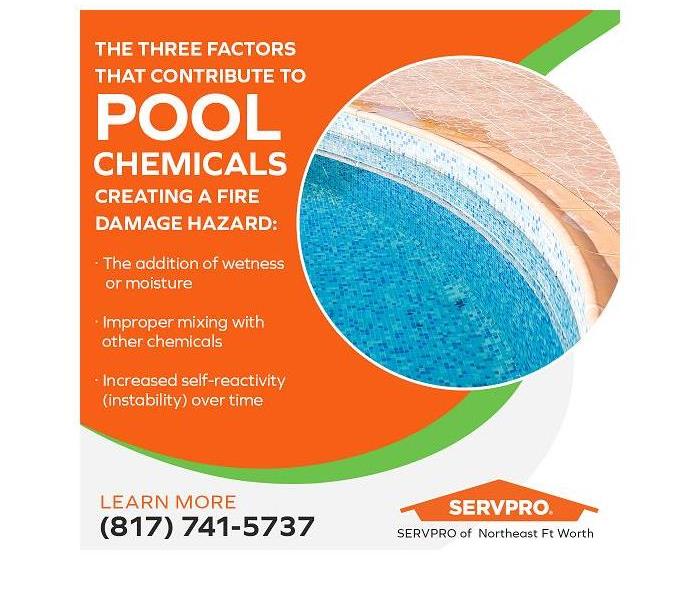How to Safely Handle and Store Pool Chemicals in Order to Prevent Fire Damage
2/11/2022 (Permalink)
Blog Summary: SERVPRO of Northeast Fort Worth highlights the fire damage hazards of the improper storage and use of volatile pool chemicals.
The professionals at SERVPRO of Northeast Fort Worth are experienced in dealing with the complex facets of fire damage restoration. Listed below are some common fire hazards in a typical home:
- Grease or cooking fires in the kitchen
- Portable heaters
- Electrical issues from extension cords, overloaded circuits, faulty wiring, or appliances
- Careless smoking
- Unattended decorative or scented candles
- Children playing with matches or lighters
- Christmas trees and decorations
- Indoor fireplaces and woodstoves
- Grill and firepit accidents
- Dryer lint fires
- Flammable liquids and aerosols
- Pool chemicals stored in the garage or near the home
A thoughtful review of this fire hazard list highlights the following important fire safety tips:
#1. Cultivate a healthy awareness of the many potential fire hazards in the typical home.
#2. Have an adequate number of strategically positioned smoke alarms with fresh batteries installed.
#3. Create an emergency plan in case of a fire.
#4. Pre-qualify a property damage restoration company in the event of a fire damage disaster.
How Pool Chemicals Can Be a Fire Hazard
Residential backyard swimming pools are very popular in the hot, dry summers of Northeast Fort Worth. A healthy awareness of the potential fire hazards in and around a typical home will include the fire damage risks of improperly handling swimming pool chemicals. Though many homeowners close their pools for the winter, they still keep pool chemicals on hand through the winter.
In an article entitled “Safe Storage and Handling of Swimming Pool Chemicals,” the Environmental Protection Agency states, “Pool chemicals may become a hazard when they become wetted by a small quantity of water or when they are improperly mixed, such as with other chemicals or reactive materials. A number of the pool chemicals, especially those exhibiting oxidation properties, can potentially be highly reactive and capable of generating high temperatures, as well as releasing toxic vapors if improperly handled or stored. Reactivity may be triggered by water wetting the chemical, or by the inadvertent mixing of a pool chemical with an incompatible material. Some pool chemicals are self-reactive over time, even without moisture addition or mixing with other materials. Pool chemicals involved in fire or toxic vapor release are likely to include those that add chlorine or a chlorine ion to the pool water for bacterial control.”
The three factors that contribute to pool chemicals creating a fire damage hazard are summed up as follows:
- the addition of wetness or moisture
- improper mixing with other chemicals
- increased self-reactivity (instability) over time
Any one or all three of these factors can cause the chemicals to reach very high temperatures, which can ignite nearby flammable items. The chemicals can also explode or give off toxic fumes that can cause serious injury or death.
Pool Chemical Handling Tips
Handle pool chemicals in a well-ventilated area. Use gloves, eye protection, and a mask when dealing with dangerous chemicals. Close containers after each use to keep out moisture. Thoroughly clean equipment and tools that were used to handle one chemical before using them with a different chemical. Clean up spilled chemicals quickly, properly, and safely.
Pool Chemical Storage Tips
Separate chemicals that might react if accidentally mixed with each other. Do not store liquids above powders that, when combined, can explode or ignite. Store pool chemicals in a locked, stand-alone shed. Do not store pool chemicals in an attached garage; the results could cause devastating fire damage to the garage and home. Do not store pool chemicals with combustibles such as gasoline, paint thinners, or other flammable liquids.
A fire damage restoration project involving pool chemicals and the potential for explosions, additional fire, and the emission of toxic gases should not be handled as a DIY project. When a situation arises from a chemical explosion or fire resulting from the improper handling of pool chemicals, SERVPRO of Northeast Fort Worth can rapidly begin the fire damage cleanup project. Technicians are highly trained and experienced in the restoration and cleaning industry. They have the proper personal protective equipment and use proven remediation techniques to safely and thoroughly restore the damaged site to its pre-disaster condition.
For more information about Haltom City, TX, fire damage restoration, contact SERVPRO of Northeast Fort Worth by calling (817) 741-5737 or emailing office@SERVPROnortheastftworth.com





 24/7 Emergency Service
24/7 Emergency Service
